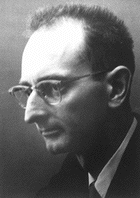Physicist Owen Chamberlain dies at 85

Renowned physicist Owen Chamberlain, who shared a Nobel Prize for introducing the world to antimatter, died Tuesday in Berkeley, Calif., at the age of 85.
Chamberlain died at his home from complications caused by Parkinson's disease, the Los Angeles Times reported.
He, along with University of California-Berkeley physicist Emilio Segre, led the team that discovered the antiproton in 1955 -- a step some scientists compare with the discovery of the electron.
"If (the antiproton) had not been discovered, the foundations of physics really would have crumbled," Nobel physicist Steven Weinberg of the University of Texas told the New York Times.
An emeritus professor of physics at UC Berkeley, Chamberlain had remained active within world of science and on Monday attended a physics colloquium, his wife said.
During his career, Chamberlain worked on the Manhattan Project, helping create the atomic bomb, and attended the first atomic bomb test at Alamogordo, N.M., in 1945, the Los Angeles Times said. He bet $5 the bomb wouldn't explode. He lost.
Copyright 2006 by United Press International

















